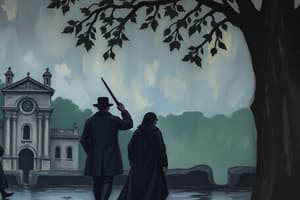Podcast
Questions and Answers
The concept of civil liberties began to take shape in seventeenth century France.
The concept of civil liberties began to take shape in seventeenth century France.
False (B)
The Bill of Rights is considered one of the first significant written statements of rights after the Renaissance period.
The Bill of Rights is considered one of the first significant written statements of rights after the Renaissance period.
False (B)
The English Constitution included the Bill of Rights since 1589.
The English Constitution included the Bill of Rights since 1589.
False (B)
The Universal Declaration of Human Rights was adopted by the United Nations General Assembly in 1948.
The Universal Declaration of Human Rights was adopted by the United Nations General Assembly in 1948.
The Universal Declaration of Human Rights proclaims 20 rights.
The Universal Declaration of Human Rights proclaims 20 rights.
One of the rights proclaimed by the Universal Declaration of Human Rights is the right to free education.
One of the rights proclaimed by the Universal Declaration of Human Rights is the right to free education.
Civil rights only cover legal safeguards provided by governments to its citizens.
Civil rights only cover legal safeguards provided by governments to its citizens.
Human rights include rights that are granted based on a person's wealth or social status.
Human rights include rights that are granted based on a person's wealth or social status.
The right to vote is an example of a human right.
The right to vote is an example of a human right.
Segregation of public schools was deemed constitutional according to the Brown v. Board of Education case.
Segregation of public schools was deemed constitutional according to the Brown v. Board of Education case.
Nelson Mandela fought for democracy and equality in North America.
Nelson Mandela fought for democracy and equality in North America.
Everyone has the right to participate in democratic processes according to the text.
Everyone has the right to participate in democratic processes according to the text.
Study Notes
Rights, both civil and human, are fundamental aspects of our societies that have been established over time to protect individuals from harm and to ensure their freedoms and well-being. In this article, we'll explore how rights came into being, what they encompass, and some examples of rights in action.
Historical Context of Rights
Rights, in a broad sense, have existed throughout history. Ancient Greek philosophy, for example, emphasized individual autonomy and freedom of thought. However, it wasn't until the Enlightenment period, particularly in seventeenth century England, that the concept of civil liberties began to take shape. The Bill of Rights, part of the English Constitution since 1689, is considered one of the first significant written statements of rights to appear after the Middle Ages. This document set out various protections for citizens against arbitrary actions by the government and laid the groundwork for future declarations of rights.
In more recent times, the Universal Declaration of Human Rights was adopted by the United Nations General Assembly on December 10, 1948, spelling out the basic rights to which all human beings are entitled. It proclaims 30 rights, including the right to life, liberty, and security; equality before the law, and equal protection of the law without distinction; and prohibitions against slavery, torture, and arbitrary detention. The UDHR serves as a global standard of achievement in promoting and protecting human dignity and human rights.
Types of Rights
There are two main categories of rights — civil rights and human rights. Civil rights refer specifically to the legal safeguards provided by governments to its citizens, ensuring equal justice and fair treatment under the law. These include the right to vote, the right to free speech, and the right to due process. Human rights, on the other hand, cover a broader range of fundamental rights that belong to every person simply because they are human, regardless of where they live, whether they were born wealthy or poor, or any other distinctions between people. Examples of human rights include the right to life, the right to education, and the right to political participation.
Examples of Rights in Action
An example of civil rights in action would be the landmark Brown v. Board of Education case in 1954, which ruled that segregation of public schools within states violated the Fourteenth Amendment equal protection clause and went against the principle of 'separate but equal'. This decision was a major step towards ending racial segregation in America and was later followed by many similar rulings.
As for human rights, consider the case of Nelson Mandela who fought for democracy and equality in South Africa during apartheid. He spent 27 years imprisoned for his beliefs but eventually became the country's first democratically elected president and played a pivotal role in bringing an end to apartheid and establishing a multi-racial democracy.
Conclusion
Understanding the nature of rights provides us with a clearer picture of the world around us and helps us appreciate the value of personal freedom, equality, and respect for others. While there may be disagreements regarding specific applications of rights, the general principles underlying them remain valid across cultures and eras. For instance, everyone has the right to express opinions and ideas without fear of retribution, and the right to participate in democratic processes that govern us. By recognizing these universal truths, we can work together to uphold and defend the rights of all individuals to lead safe, healthy, and productive lives.
Studying That Suits You
Use AI to generate personalized quizzes and flashcards to suit your learning preferences.
Description
Explore the historical context, types, and examples of civil and human rights. Learn about the development of rights from ancient times to the present, the distinctions between civil and human rights, and significant cases that shaped the protection of rights globally.




